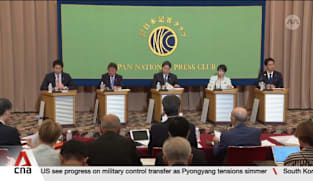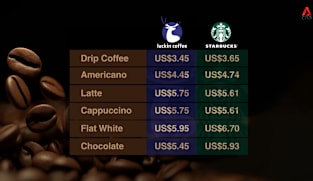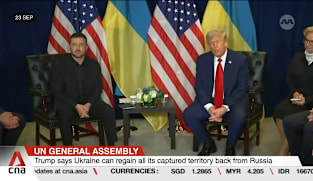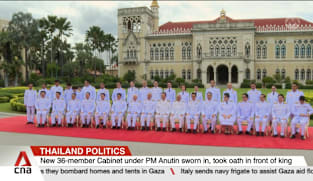Committee of Supply 2023 debate, Day 3: Tan See Leng on reinventing and thinking long term to grow sustainably
The measures to manage the energy crisis have stabilised the electricity markets for now, but this is unlikely to be the last energy crunch that Singapore will see as the world embarks on the energy transition, said Second Minister for Trade and Industry Tan See Leng. Speaking in Parliament on Tuesday (Feb 28), he outlined three key strategies that the Ministry of Trade and Industry (MTI) is taking to support the critical transformation needed. First, it will develop new energy supply sources to diversify and decarbonise Singapore's energy supply. It will improve the energy efficiency of new and repowered natural gas power generation units through new emission standards, which will be introduced later this year. It will also tap into regional power grids to access cleaner energy sources abroad. To prepare for large-scale imports, the Energy Market Authority (EMA) is conducting small-scale trials. Dr Tan said such projects will help Singapore to learn, build confidence and pave the way for larger-scale electricity import projects. Second, MTI will strengthen the energy market structure to ensure that it continues to function well under volatile conditions. Under its National Hydrogen Strategy, there are plans to develop hydrogen as a major decarbonisation pathway for the power and industry sectors to support Singapore’s commitment to achieve net-zero by 2050. A key prong of the strategy is to experiment with the use of advanced hydrogen technologies on the cusp of commercial readiness. EMA and the Maritime and Port Authority of Singapore have launched an expression of interest for utilising ammonia for power generation and to support maritime bunkering needs. They have received strong interest from industry players and international partners. Third, MTI will build strong international collaborations to secure Singapore's energy supply and energy technologies. It is accelerating solar deployment and deploying energy storage systems to store and dispense intermittent solar power at different times to maintain grid reliability. Dr Tan said the global energy market will be turbulent in the coming years because of geopolitics and climate action. Singapore will update its regulatory approach to strengthen the foundations of the energy market. To ensure that there is sufficient power generation capacity to serve demand, the Government will call for competitive tenders for new generation capacity and build the required new capacity if there is insufficient interest from private generation companies. EMA's Standby Fuel Facility, started during the recent energy crisis, will be made permanent as a fallback plan should there be disruptions to energy supplies. EMA intends to enhance the regulatory requirements on electricity retailers to strengthen consumer protection and the retailers’ ability to withstand market volatility. Dr Tan said the energy transition is challenging, especially with increased volatility in global energy markets. MTI will work closely with its industry stakeholders and international partners to enhance Singapore's energy resilience in a low-carbon world. Turning to local enterprises, Dr Tan said the Government will support firms to maximise their human capital and develop innovation capabilities. He highlighted the enterprise-specific schemes to help companies maximise their human capital at all levels, "from the intern to the CEO".
The measures to manage the energy crisis have stabilised the electricity markets for now, but this is unlikely to be the last energy crunch that Singapore will see as the world embarks on the energy transition, said Second Minister for Trade and Industry Tan See Leng. Speaking in Parliament on Tuesday (Feb 28), he outlined three key strategies that the Ministry of Trade and Industry (MTI) is taking to support the critical transformation needed. First, it will develop new energy supply sources to diversify and decarbonise Singapore's energy supply. It will improve the energy efficiency of new and repowered natural gas power generation units through new emission standards, which will be introduced later this year. It will also tap into regional power grids to access cleaner energy sources abroad. To prepare for large-scale imports, the Energy Market Authority (EMA) is conducting small-scale trials. Dr Tan said such projects will help Singapore to learn, build confidence and pave the way for larger-scale electricity import projects. Second, MTI will strengthen the energy market structure to ensure that it continues to function well under volatile conditions. Under its National Hydrogen Strategy, there are plans to develop hydrogen as a major decarbonisation pathway for the power and industry sectors to support Singapore’s commitment to achieve net-zero by 2050. A key prong of the strategy is to experiment with the use of advanced hydrogen technologies on the cusp of commercial readiness. EMA and the Maritime and Port Authority of Singapore have launched an expression of interest for utilising ammonia for power generation and to support maritime bunkering needs. They have received strong interest from industry players and international partners. Third, MTI will build strong international collaborations to secure Singapore's energy supply and energy technologies. It is accelerating solar deployment and deploying energy storage systems to store and dispense intermittent solar power at different times to maintain grid reliability. Dr Tan said the global energy market will be turbulent in the coming years because of geopolitics and climate action. Singapore will update its regulatory approach to strengthen the foundations of the energy market. To ensure that there is sufficient power generation capacity to serve demand, the Government will call for competitive tenders for new generation capacity and build the required new capacity if there is insufficient interest from private generation companies. EMA's Standby Fuel Facility, started during the recent energy crisis, will be made permanent as a fallback plan should there be disruptions to energy supplies. EMA intends to enhance the regulatory requirements on electricity retailers to strengthen consumer protection and the retailers’ ability to withstand market volatility. Dr Tan said the energy transition is challenging, especially with increased volatility in global energy markets. MTI will work closely with its industry stakeholders and international partners to enhance Singapore's energy resilience in a low-carbon world. Turning to local enterprises, Dr Tan said the Government will support firms to maximise their human capital and develop innovation capabilities. He highlighted the enterprise-specific schemes to help companies maximise their human capital at all levels, "from the intern to the CEO".



















